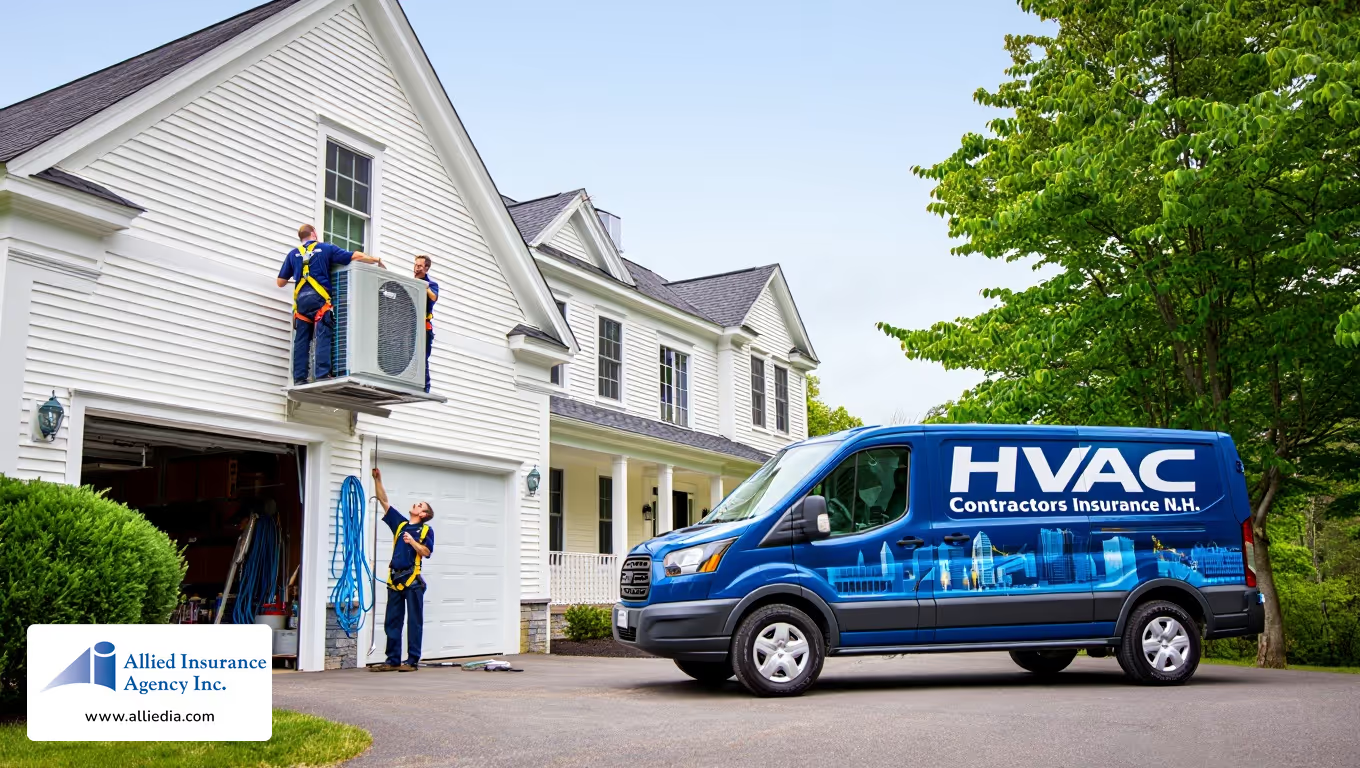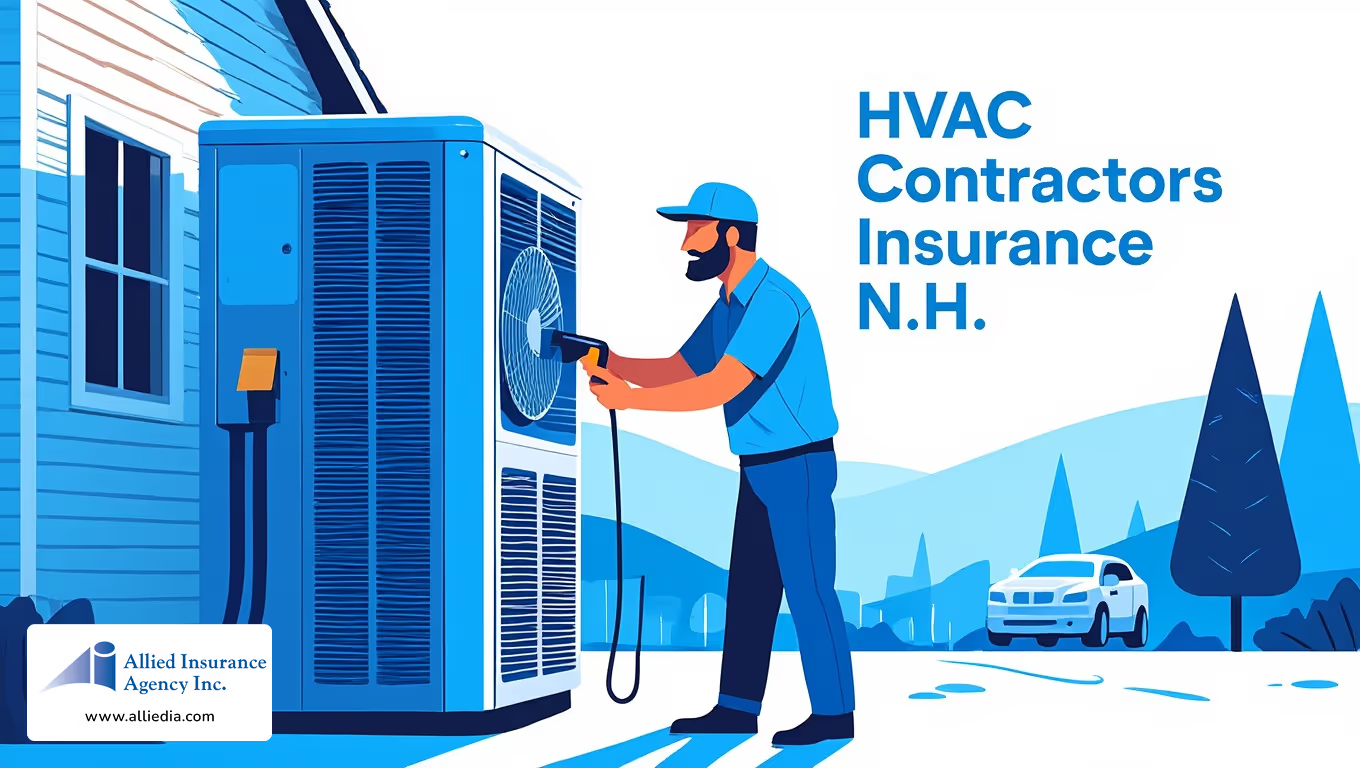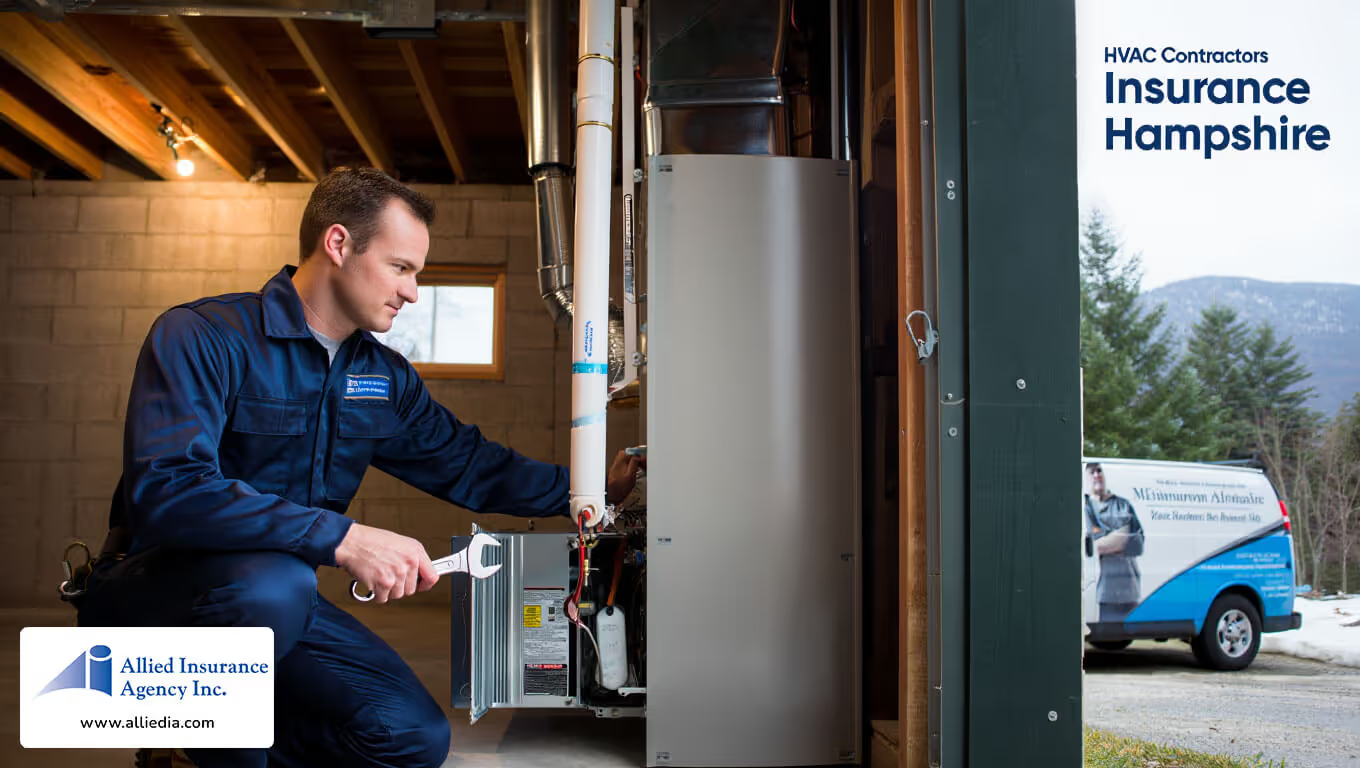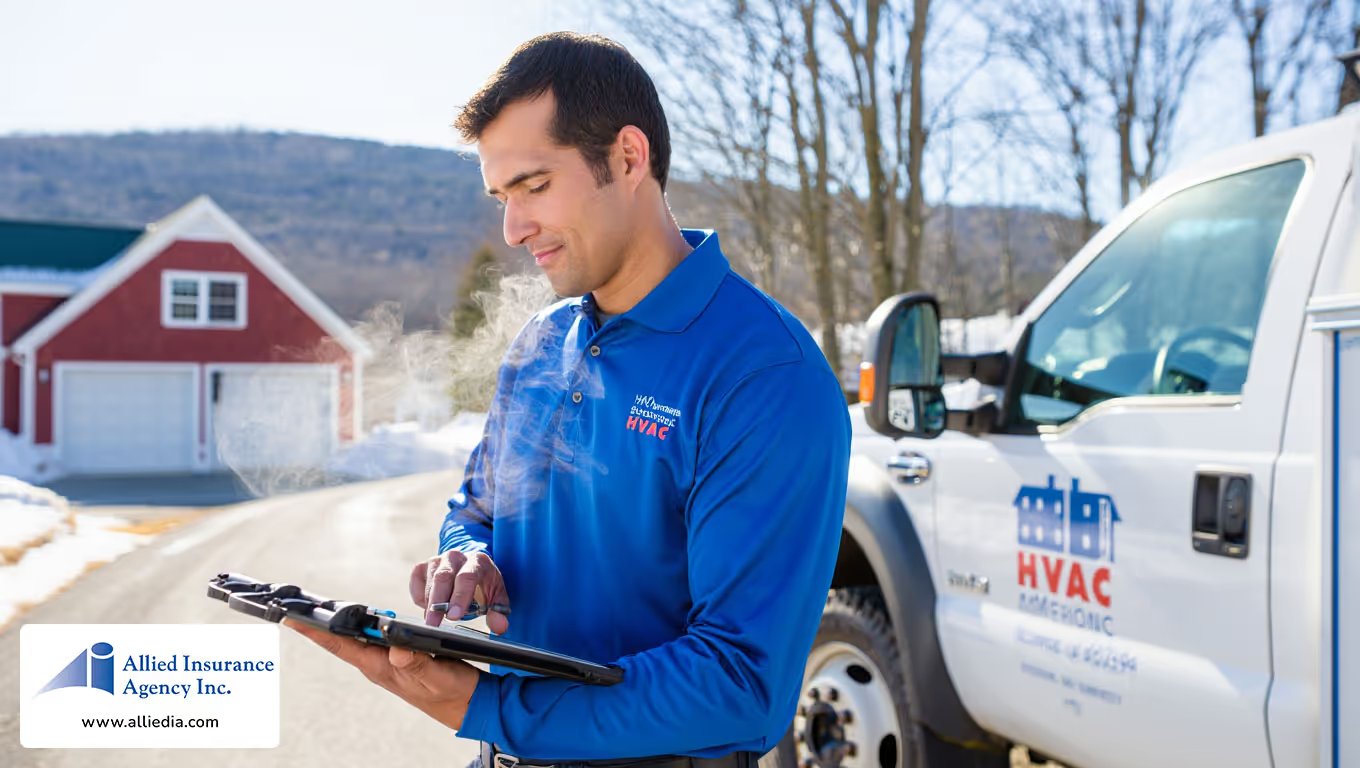
The Ultimate Guide to N.H. HVAC Contractors Insurance
What’s the one protection most New Hampshire heating and cooling specialists overlook until it’s too late? While technicians focus on complex installations and emergency repairs, many forget how local weather patterns and regulations shape their financial safety net.
Granite State businesses in this field navigate unique hurdles. Winter storms test equipment durability, while summer humidity spikes service demands. Municipal codes vary across Manchester, Nashua, and rural towns, creating compliance puzzles. Without tailored safeguards, a single mishap could derail operations.
This guide explores critical protections for climate-control professionals. Learn how specialized plans address workplace injuries, client property damage, and tool theft. Discover why generic policies often fail to cover frost-related system failures or coastal moisture damage common in Portsmouth and Hampton.
Proper coverage does more than satisfy legal mandates—it protects livelihoods. For local specialists installing heat pumps in Concord or servicing commercial units in Dover, the right plan turns potential disasters into manageable setbacks. Stay compliant while securing your company’s future in New England’s evolving market.
Introduction to HVAC Contractors Insurance in New Hampshire
New Hampshire’s unpredictable weather and strict regulations demand specialized safeguards for climate-control specialists. Professionals balancing installations in historic Concord homes and commercial projects in Bow face risks shaped by geography and local laws.
Understanding Regional Risks in Concord, Bow, and Hooksett
Frigid winters test heating systems, while summer humidity strains cooling units. Towns like Hooksett enforce unique building codes for older structures, requiring tailored solutions. A burst pipe in a 19th-century Manchester residence poses different liabilities than a modern heat pump installation in Portsmouth.
Why Localized Protection Matters for Climate-Control Specialists
State licensing requires proof of financial responsibility, including surety bonds. Coastal projects near Hampton face saltwater corrosion risks absent inland. Coverage addressing frost-related equipment failures or sudden temperature swings keeps businesses operational during peak demand periods.
Local competition drives service guarantees that increase liability exposure. Policies adapting to these variables help professionals maintain compliance while securing client trust across diverse project types.
Scope of HVAC Contractors Insurance Coverage
Specialized protection plans for climate-control professionals address distinct challenges across residential and commercial projects. Tailored solutions account for everything from tool transport risks to compliance with Manchester’s historic property codes.
General Liability and Property Damage Protection
General liability protection shields businesses from costs when third parties experience harm during service calls. This includes medical bills if a client trips over equipment or repairs if a ladder scratches hardwood floors. Property damage coverage extends to accidental impacts on landscaping, walls, or personal belongings during installations.
Workers Compensation and Equipment Insurance Details
State-mandated workers compensation handles injuries sustained during rooftop unit repairs or boiler maintenance. It covers hospital visits and wage replacement while employees recover. Equipment insurance safeguards high-value items like refrigerant leak detectors and copper tubing against theft from job sites or damage during coastal-area transport.
Comprehensive plans combine these elements with add-ons like inland marine policies for mobile assets. Evaluating deductibles and coverage ceilings helps balance upfront costs with long-term security. Proper safeguards let professionals focus on complex tasks without fearing financial ruin from unexpected incidents.

Key Considerations for HVAC Contractors Insurance
Choosing the right safeguards for climate-control operations requires careful analysis of project variables across New Hampshire’s diverse landscapes. Service teams must balance technical demands with financial safeguards that adapt to shifting workloads and regional challenges.
Evaluating Project Risks and Requirements
Project size directly impacts protection needs. Large commercial installations in Manchester’s business districts often demand coverage limits five times higher than residential tune-ups in Wolfeboro. Property managers and developers frequently set minimum policy thresholds before approving bids—sometimes requiring $2 million in general liability coverage.
Service territories create distinct exposure patterns. Teams covering both coastal Portsmouth and mountainous North Conway face salt-air corrosion risks alongside winter access challenges. Rural routes add vehicle wear-and-tear costs that urban specialists rarely encounter.
Growth plans influence long-term decisions. Expanding payrolls in Nashua or adding apprentices in Concord necessitates scalable plans that adjust with team size. Seasonal spikes in emergency furnace repairs require flexible payment structures to avoid overpaying during slower months.
Effective risk management combines historical data with proactive measures. Tracking incident patterns helps identify weak spots in safety training or equipment maintenance routines. Regular policy reviews ensure coverage aligns with current client expectations and evolving state regulations.
How HVAC Contractors Insurance Shields Your Business
Operating without proper safeguards exposes businesses to unexpected liabilities. New Hampshire’s climate-control professionals face unique risks—from icy Manchester rooftops to cramped Portsmouth basements. Specialized coverage acts as a financial shield when challenges arise.
Managing Operational Risks Effectively
Liability protection prevents catastrophic losses when clients allege property damage or injuries. Imagine a ladder denting a historic Dover home’s flooring during maintenance. Coverage handles repair costs and legal fees, preserving cash flow.
Accident policies address sudden incidents like refrigerant leaks or tool malfunctions. These plans cover medical bills if technicians sustain injuries while servicing complex systems. They also fund equipment replacements after thefts from Nashua job sites.
When disputes escalate, claims defense support provides expert legal teams. This proves vital when facing allegations of code violations in Concord or faulty installations in coastal areas. Businesses maintain operations during lengthy court processes, protecting vendor relationships and payroll obligations.
Third-party injury coverage safeguards against visitor mishaps at work locations. A client slipping near exposed wiring during a Keene furnace upgrade won’t drain company reserves. Comprehensive plans transform potential disasters into manageable expenses, ensuring long-term stability. Contact Allied for the best artisan contractors insurance in New Hampshire.

HVAC Contractors Insurance Requirements and Regulations
Navigating New Hampshire’s regulatory landscape requires precision. Specialists must align their safeguards with state mandates and municipal codes to maintain operational legitimacy. Local authorities in Concord and Bow enforce distinct protocols for historic property upgrades versus modern installations.
Licensing Essentials Across Regions
State licensing demands proof of financial responsibility through active policies. Professionals in Hooksett face $1 million minimum general liability thresholds for commercial projects. Workers compensation activates automatically with first hires, covering ladder falls or electrical shocks during repairs.
Mandatory Safeguards for Operational Continuity
Municipal permits in Bow require certificates showing uninterrupted coverage. A single lapse could freeze projects mid-installation. Coastal towns like Portsmouth add bonding requirements for contractors servicing moisture-prone properties.
Seasonal workforce expansions trigger policy adjustments. Temporary teams servicing Manchester’s winter heating surge need updated compensation plans. Compliance isn’t static—it evolves with team size, service areas, and equipment upgrades.
Proof of coverage remains critical for bidding on public projects. Contractors restoring Dover’s municipal buildings must demonstrate $2 million liability limits. These standards protect both businesses and communities from unresolved claims.
Exploring Additional Insurance Options for HVAC Contractors
Specialized climate-control professionals require layered safeguards beyond standard policies. While core protections address common risks, New Hampshire’s variable conditions demand supplementary plans. These additions fill gaps in traditional coverage, particularly during equipment transport or large-scale installations.
Inland Marine, Installation Floater, and Commercial Umbrella
Inland marine insurance protects high-value tools during transit across Manchester’s busy streets or rural routes. It covers theft of copper piping from parked vans or storm damage to diagnostic gear stored at Portsmouth job sites. This solution extends beyond standard property policies, addressing mobile asset vulnerabilities.
Installation floaters shield materials like ductwork before final setup. Imagine a sudden hailstorm damaging condenser units awaiting installation in Concord. This coverage handles repair costs without draining operational funds.
Commercial umbrella policies act as financial reinforcements. When liability claims exceed standard limits—like multiple injury lawsuits at a Nashua construction site—this layer prevents catastrophic payouts. It supplements existing protections for workplace incidents or vehicle accidents.
Builder’s risk plans prove vital for new construction projects in Bow or Dover. They safeguard unfinished structures from vandalism or weather damage during installation phases. Separate from standard property insurance, these policies align with project timelines.
Transportation needs require tailored solutions. Commercial auto insurance addresses collisions involving specialized vehicles carrying refrigerants through icy mountain passes. It also covers cargo losses if tools slide off trucks on winding coastal roads.
Tool-specific plans protect calibration devices and testing instruments critical for precision work. Without this coverage, replacing stolen infrared cameras or leak detectors could disrupt service schedules across multiple towns.
Securing Comprehensive HVAC Insurance with Allied Insurance Agency
Tailored protection plans transform unpredictable risks into manageable costs for climate-control specialists. Allied a local N.H. insurance agency in Bow, delivers customized solutions aligned with New Hampshire’s unique operational demands, from Portsmouth’s coastal projects to Manchester’s historic renovations.
How to Get a Free Artisan Contractors Quote
Obtaining coverage starts with a 10-minute digital assessment. Share basic details about service areas, team size, and vehicle usage. The agency cross-references this data with regional building codes and weather patterns to craft adaptable policies.
Local advisors simplify complex decisions by explaining coverage limits and exclusions in clear terms. They prioritize safeguards against seasonal equipment failures or client disputes common in Nashua and Concord. Immediate certificate access lets businesses bid on projects without delays.
Ongoing support ensures policies evolve with company growth. Whether expanding into Bow’s residential markets or upgrading commercial fleets, specialists maintain compliance while optimizing costs. This proactive approach turns bureaucratic hurdles into strategic advantages.
Benefits of Bundling Multiple Coverage Policies
Smart financial planning separates thriving climate-control specialists from those struggling with unpredictable expenses. Combining protections into unified packages unlocks premium savings while strengthening operational safeguards across New Hampshire’s demanding service environments.
Savings and Enhanced Protection Strategies
Bundling general liability, commercial vehicle, and equipment coverage often yields 25% premium discounts. This approach eliminates redundant protections while closing gaps in traditional plans. Contractors servicing both coastal and mountain regions gain consistent safeguards against saltwater corrosion and winter storm damage.
Simplified administration reduces paperwork headaches. Single renewal dates and unified billing cycles save hours typically spent tracking multiple policies. Coordinated claims handling ensures faster resolutions when incidents occur during Manchester installations or Dover emergency repairs.
Strategic bundling adapts to evolving business needs. Annual coverage reviews identify emerging risks like expanded payrolls or new service vehicles. Proactive adjustments maintain compliance with Nashua’s historic property codes and Concord’s commercial project requirements.
Long-term relationships with providers like Allied Insurance Agency foster cost stability. Loyalty discounts and priority service support sustainable growth across New Hampshire’s competitive markets. Bundled plans transform complex protections into streamlined tools for financial resilience. Contact Allied for the best artisan contractors insurance in New Hampshire.

Understanding HVAC Insurance Cost Factors
Managing expenses requires understanding what shapes protection costs for climate-control specialists. Multiple variables influence pricing across New Hampshire, from project scales in Manchester to workforce sizes in Nashua.
Breaking Down Financial Variables
Project complexity directly affects financial safeguards. Companies handling industrial installations near Portsmouth’s coast face higher rates than those servicing residential units in Concord. Commercial jobs often involve pricier equipment and stricter safety protocols, increasing potential claims.
Payroll totals and employee roles also matter. Teams with specialized technicians working on historic Bow properties may see different rates than general maintenance crews. More workers mean greater exposure to workplace incidents, impacting premium calculations.
Business vehicle types play a key role. Fleets transporting heavy machinery through mountainous regions need robust auto coverage compared to urban service vans. Frequent travel on icy roads near Lake Winnipesaukee raises risks, affecting policy costs.
Regularly reviewing these factors helps companies optimize plans while meeting state requirements. Tailoring safeguards to specific operations balances affordability with essential protections.



